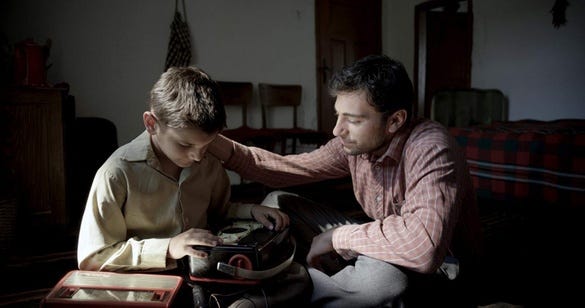Heartland Film Festival: Radiogram

For showtimes and tickets, please click here.
The only people who say money isn’t all that important is those who already have gobs and gobs of it. It goes the same way with freedom. You don’t know what it’s like to live in a closed society unless you’ve been there.
Bulgaria in 1971 had been under the Communist thumb for some time, but authorities were rolling out new means of oppression. All expressions of religious faith were banned. Those with Muslim names, or ones not amenable to the modernist chic, were to be dropped in favor of new ones selected for you.
In “Radiogram” we see this pogrom playing out in a remote rural village. It’s the sort of place where everybody knows everyone else. And yet some like Zahariev (a chilling Aleksander Aleksiev) are one side of the new power dynamic, and then there’s everyone else.
Zahariev is a local boy who has traded in his overalls for gray suits, slicked-down hair and an omnipresent cigarette between his thin lips. He obviously revels in his authority, controlling the very quotidian existence of those he’s spent his whole life around. One young man was quietly disappeared for his resistance.
Zahariev’s new target is Ali (Alexander Hadjiangelov), a former boyhood rival. Ali is now married to Yasmin (Yana Titova) and has two small children. The eldest, Ahmet (Alexander Ivanov) is obsessed with American rock ‘n’ roll music, and the family sneaks signals from Radio Free Europe on their battered old radio.
In an early scene Zahariev simply enters their home -- no permission asked, no reason given. He sucks on his tobacco sticks and peruses through their things. His purpose, we suspect, is less to find something than to let them know who’s boss.
The radio is damaged during this event, and later smashed further by Ali himself when Ahmet insists on continuing to play the forbidden music. Knowing he has broken the trust of his family, he sets off on a long excursion to buy a new one.
Radios are not hard to find in 1971 Bulgaria, so that means walking to the nearest town of any size 100 kilometers distant. Along the way Ali runs into Metodi, the brother of the disappeared youth, who fled rather than suffer the same fate. They fall in together, their missions joining.
Directed by Rouzie Hassanova, “Radiogram” is a splendidly beautiful film that shows off the Bulgarian countryside to great effect. How can a land so lovely contain so much human ugliness and squalor? Because people are as endlessly capable of deprivation of the soul as they are filling it with joy.
It may not sound like a big deal to be able to listen to a little boogie-woogie music. But when the ruling party is telling you how to live, even down to forcing you to change your own name, the tiniest sliver of freedom is a ray of hope.



